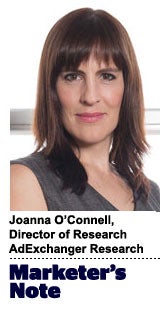 “Marketer’s Note” is a weekly column informing marketers about the rapidly evolving, digital marketing technology ecosystem. It is written by Joanna O’Connell, Director of Research, AdExchanger Research.
“Marketer’s Note” is a weekly column informing marketers about the rapidly evolving, digital marketing technology ecosystem. It is written by Joanna O’Connell, Director of Research, AdExchanger Research.
Today marks the release of AdExchanger Research’s inaugural State of Programmatic Media report. Based on data gleaned from more than 450 completed surveys and a range of in-depth interviews, this report takes a deep look at the programmatic ecosystem through the lens of marketers, agencies, publishers and technology providers.
The primary goals of this research were two-fold: first, cut through the rhetoric and get a real sense of what’s happening on the ground in terms of programmatic spend and ad sales, channel adoption, approaches to service and technology questions, obstacles to continued growth and more; and second, to lay the foundation for benchmarking the programmatic space over time. (Read: look out for an updated version of this report – with longitudinal comparisons – down the line!)
That said, I’m pleased to share some highlights with you here:
- Marketer spending on programmatic is strong and growing. Perhaps no big surprise to some of you, but the marketer community who participated in our research study (admittedly, a savvy, lean forward crowd), many of whom are massive spenders in digital, are investing in programmatic, with short term plans for further investment. In fact, the majority of marketer respondents are managing 20% or more of their media programmatically, and nearly half are managing 40% or more of their digital media budget this way.
- Agencies also are investing heavily, and plan to double down. The agency respondent pool – comprised of employees from shops big and small, independent trading desks and holding company desks, among others – are also committed to programmatic, if their current and projected spend patterns are any indication. Nearly half of agency respondents plan on managing at least 60% of their total digital budget programmatically in the next twelve months.
- Publishers generally remain cautious, but there’s movement. A pricing/inventory schism remains – while more than half of publisher respondents indicate they are currently selling at least 20% of inventory programmatically, just over a third note it accounts for 20% or more of revenue – but there are signs of optimism on that front, as buyer investment in programmatic direct deals, in their many forms, continues to grow.
- Programmatic benefits are in the eye of the beholder. “Audience targeting” and “improved ROI” are key perceived benefits of programmatic for marketers while agencies place relatively more value on “operational efficiency”, the benefit mostly heavily weighted by publishers as well. No one cited pricing – whether it be “lower CMPs” for buyers or “higher CPMs” for sellers – as a key benefit.
- The key challenges to programmatic are inventory quality issues, market complexity and lack of market understanding. More than a quarter of marketer respondents cite inventory quality issues as the key challenge programmatic faces, a concern shared by agency and publisher respondents alike. There is also general consensus that the ecosystem remains too complex and that more education on programmatic – what it is, how it works, what it means for the industry – is needed all around.
I found the process of conducting this research – unpacking the results from our survey, speaking to marketers, agencies and publishers about their specific experiences with programmatic, pulling out the broader themes to surface the full story – illuminating and fun (because I’m a dork). I was also largely encouraged. It really feels as though the question, “Is programmatic here to stay?” can officially be replaced with, “Where will programmatic go next?”
Joanna
Follow Joanna O’Connell (@joannaoconnell ) and AdExchanger (@adexchanger) on Twitter.












